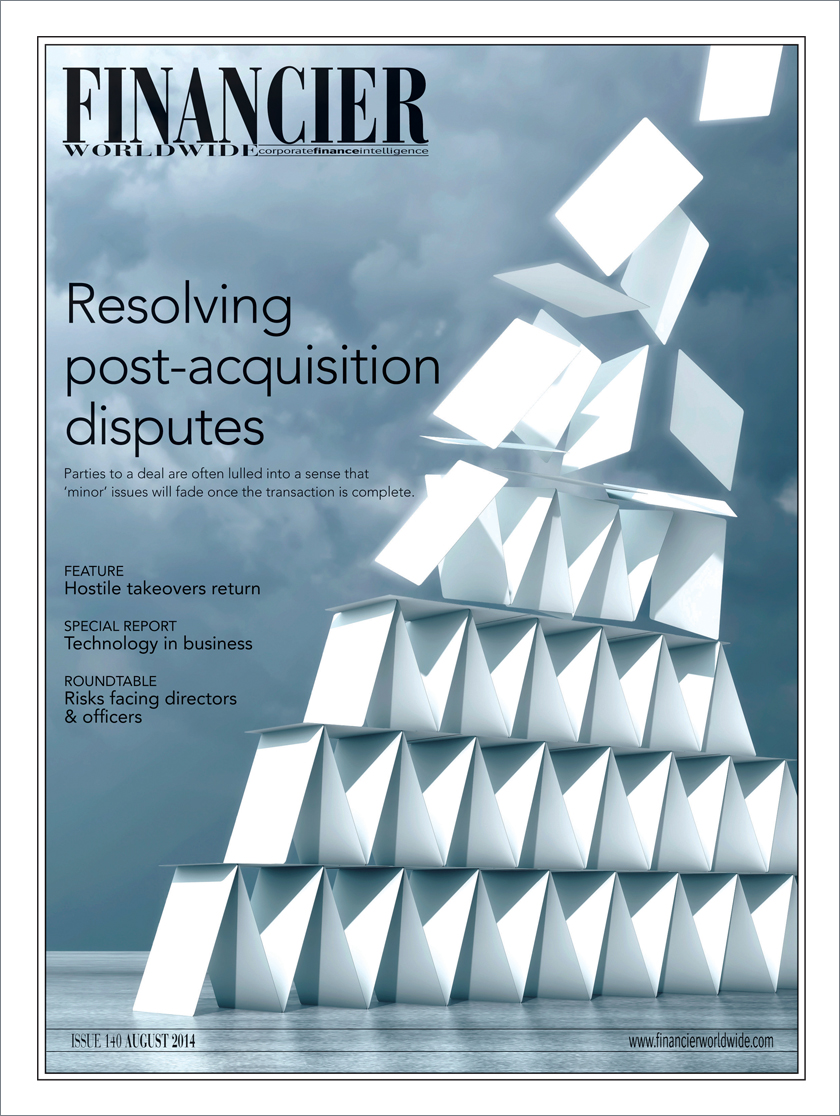M&A activity in recent years has undergone a number of different phases. The boom years of the pre-financial crisis era soon gave way to a prolonged period of relative stagnation, thanks to the lasting and damaging effects of the global economic downturn.
Now that much of the dust has settled from the drawn out period of economic uncertainty, deal activity has picked up once again. Mega deals, the likes of which haven’t been seen for a number of years, have become more prevalent. Alongside this resurgence, markets and companies worldwide have are bearing witness to the return of another divisive and controversial form of M&A: the hostile takeover.
In 2014 to date, hostile offers have accounted for their greatest proportion of global deal activity in 14 years. The re-emergence of hostile deals has coincided with resurgent economic confidence across many sectors. Confidence in the boardroom is up, which has undoubtedly had an effect on the number of hostile takeovers being pursued. As the economic outlook appears relatively stable, with stock prices riding high and growth in the US steady, executives are more willing to make a move for companies they have long coveted but hesitated to formally approach.
On the opposite side of the equation, confidence in the boardroom has led boards and shareholders to resist the more friendly overtures from would-be acquirers and demand greater premiums. Target firms are more bullish about their own prospects, and so quicker to reject takeover attempts out of hand. A number of target firms this year have declared that the offers they have received were derisory or substantially undervalued the firm. This in turn has led to a higher level of hostile offers.
“In 2014 to date, hostile offers have accounted for their greatest proportion of global deal activity in 14 years.”
Twenty-five unsolicited takeover attempts have been made in 2014 so far, with a combined value of around $290bn. That is approximately 19 percent of all M&A activity in 2014, the most in any year since 2000. A large slice of that total figure is attributed to Pfizer’s unsolicited and unsuccessful $119bn offer for British-Swedish drugs manufacturer AstraZeneca. However, the Pfizer deal is not the only transaction in the pharmaceutical sector to have garnered headlines of late. Valeant Pharmaceuticals is currently embroiled in its own $53bn hostile takeover attempt for Allergan.
Boardroom confidence is one driver of hostile takeovers, but other factors are at play too. Corporate governance changes have removed some of the roadblocks companies encountered when attempting to launch hostile takeovers in the past. The decline of staggered boards of directors has also made it easier for shareholders to vote out an entire swathe of entrenched directors. Poison pills are also less common today. Additionally, with an increasing concentration of big company stocks in the hands of a select group of large, institutional investors, it has become easier for bidders to win shareholder support for hostile takeovers.
The increasing agitation of activist shareholders has had a profound effect on the resurgence of hostile takeover bids. More so than ever, activist shareholders are influencing the strategies and future of direction of companies. Some acquirers have begun to court activist shareholders, hoping to leverage their sway in the boardroom to assist their takeover attempt. Private equity firms are also engaging in some hostile takeover activity. Although KKR & Co’s unsolicited $3bn offer for Australian firm Treasury Wine Estates was rejected out of hand by the company, it is believed that the PE group will return with an improved offer – a move which could be indicative of PE’s newfound appetite for hostile deals.
Despite the resurgence of hostile takeover attempts, they are still not without their risks and restrictions. The regulatory landscape for unsolicited takeovers, although somewhat clearer than it has been in the past, can still present challenges. Antitrust regulators pay particularly close attention to hostile deals as they often take the form of horizontal takeovers.
As the global economic recovery continues and stability returns to the boardroom, there are few signs to suggest that hostile takeover activity will wane in the short term.
© Financier Worldwide
BY
Richard Summerfield

